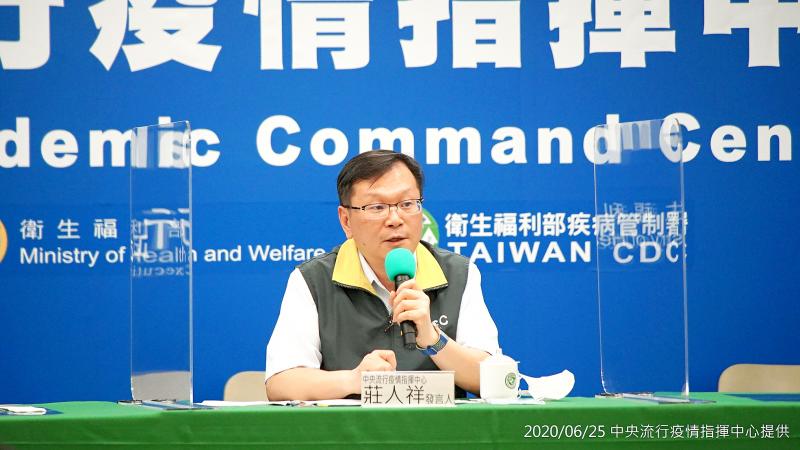The Central Epidemic Command Center (CECC) yesterday reiterated its COVID-19 testing policy amid concerns that not enough was being done after a Japanese student who last week returned home from Taiwan was confirmed to have the disease.
Taiwan on Tuesday received notice from Japanese authorities of a confirmed case of COVID-19, a female student in her 20s who had returned to Japan from Taiwan and was asymptomatic, the CECC said on Wednesday.
The student traveled to Taiwan in late February and had been studying in southern Taiwan, it said.

Photo: Lin Hui-chin, Taipei Times
She returned to Japan on Saturday last week and tested positive upon her arrival there, it said.
Japanese authorities yesterday morning told the center that the woman’s cycle threshold was 37.38, which in Taiwan would be considered a “weak positive,” Centers for Disease Control Deputy Director-General Chuang Jen-hsiang (莊人祥), spokesman for the center, told a news conference in Taipei.
Japanese authorities and the center believe that the case was unlikely to have been contagious at the time of testing, Chuang said.
As the student showed no symptoms, it is difficult to know when she was infected, he said.
The center could not rule out the possibility that the student was infected in Taiwan, he said.
The center’s policy is that if an individual is displaying symptoms and suspected of having the virus by a doctor, they can be tested, he said.
For every confirmed case of COVID-19, the center usually tests an additional 160 to 170 people, he said, adding that this level of testing was deemed to be extra cautious.
The center on Wednesday said that it identified 140 people who had been in contact with the Japanese student, including 125 people who had been placed in home isolation and 15 who have been asked to self-manage their health.
The center yesterday revised the number of people ordered into home isolation to 123.
All 123 had been tested for COVID-19 as of last night, it said.
Negative results for 109 of the 123 had been received as of press time last night.
The results for the remainder would be released today, Chuang said.
Meanwhile, the center reported one new imported case.
The patient — the nation’s 447th case — is a man in his 60s who traveled to Guatemala in early April for business, Chuang said.
On June 1, he developed symptoms including coughing, shortness of breath and aching bones, Chuang said.
The man sought medical advice in Guatemala, but twice tested negative for the novel coronavirus, Chuang said.
On Tuesday, the man’s symptom of breathlessness worsened, Chuang said, adding that upon his arrival in Taiwan on Wednesday, he reported his situation to authorities at the airport and was retested.
He was sent to a quarantine facility and did not come into contact with family members or friends in Taiwan, Chuang said.
Ten passengers sat in the two rows in front of and behind the man and they have been ordered to isolate at home, he said.
Additional reporting by Lin Hui-chin

Intelligence agents have recorded 510,000 instances of “controversial information” being spread online by the Chinese Communist Party (CCP) so far this year, the National Security Bureau (NSB) said in a report yesterday, as it warned of artificial intelligence (AI) being employed to generate destabilizing misinformation. The bureau submitted a written report to the Legislative Yuan in preparation for National Security Bureau Director-General Tsai Ming-yen’s (蔡明彥) appearance before the Foreign Affairs and National Defense Committee today. The CCP has been using cognitive warfare to divide Taiwanese society by commenting on controversial issues such as Taiwan Semiconductor Manufacturing Co’s (TSMC, 台積電) investments in the

INVESTIGATION: The case is the latest instance of a DPP figure being implicated in an espionage network accused of allegedly leaking information to Chinese intelligence Democratic Progressive Party (DPP) member Ho Jen-chieh (何仁傑) was detained and held incommunicado yesterday on suspicion of spying for China during his tenure as assistant to then-minister of foreign affairs Joseph Wu (吳釗燮). The Taipei District Prosecutors’ Office said Ho was implicated during its investigation into alleged spying activities by former Presidential Office consultant Wu Shang-yu (吳尚雨). Prosecutors said there is reason to believe Ho breached the National Security Act (國家安全法) by leaking classified Ministry of Foreign Affairs information to Chinese intelligence. Following interrogation, prosecutors petitioned the Taipei District Court to detain Ho, citing concerns over potential collusion or tampering of evidence. The

‘COMPREHENSIVE PLAN’: Lin Chia-lung said that the government was ready to talk about a variety of issues, including investment in and purchases from the US The National Stabilization Fund (NSF) yesterday announced that it would step in to staunch stock market losses for the ninth time in the nation’s history. An NSF board meeting, originally scheduled for Monday next week, was moved to yesterday after stocks plummeted in the wake of US President Donald Trump’s announcement of 32 percent tariffs on Taiwan on Wednesday last week. Board members voted to support the stock market with the NT$500 billion (US$15.15 billion) fund, with injections of funds to begin as soon as today. The NSF in 2000 injected NT$120 billion to stabilize stocks, the most ever. The lowest amount it

NEGOTIATIONS: Taiwan has good relations with Washington and the outlook for the negotiations looks promising, Minister of Economic Affairs J.W. Kuo said Taiwan’s GDP growth this year is expected to decrease by 0.43 to 1.61 percentage points due to the effects of US tariffs, National Development Council (NDC) Minister Paul Liu (劉鏡清) said at a meeting of the legislature’s Economics Committee in Taipei yesterday, citing a preliminary estimate by a private research institution. Taiwan’s economy would be significantly affected by the 32 percent “reciprocal” tariffs slapped by the US, which took effect yesterday, Liu said, adding that GDP growth could fall below 3 percent and potentially even dip below 2 percent to 1.53 percent this year. The council has commissioned another institution